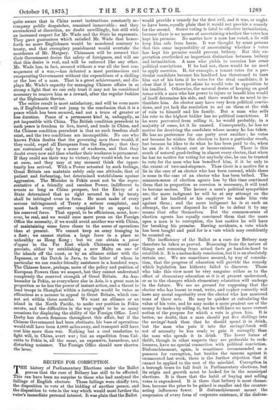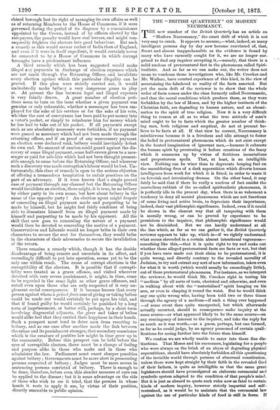RECIPES FOR CORRUPTION.
THE history of Parliamentary Elections under the Ballot proves that the cure of Bribery has still to be effected. This can have been no surprise to those who had analysed the failings of English electors. These failings were chiefly two, the disposition to vote at the bidding of another person, and the disposition to vote in the way which would most further the voter's immediate personal interest. It was plain that the Ballot
would provide a remedy for the first evil, and it was, or ought to have been, equally plain that it would not provide a remedy for the second. Secret voting is fatal to effective intimidation, because there is no means of ascertaining whether the voter has kept his promise. No matter how a man has voted, a lie will keep him safe from harm. It was thought by some persons that this same impossibility of ascertaining whether a voter has kept his promise would prevent bribery. But this ex- pectation overlooked an important distinction between bribery and intimidation. A man who yields to coercion has some political convictions. If he had not, there would be no need to apply coercion. If, for example, a tenant votes for a par- ticular candidate because his landlord has threatened to turn him out of his farm if he votes for the rival candidate, it is clear that if he were let alone he would vote in opposition to his landlord. Otherwise, the natural desire of keeping on good terms with a man who has power to injure or benefit him would of itself determine his side, and there would be no need to in- timidate him. An elector may have very keen political convic- tions, and yet lack the resolution to act on them at the risk of ruin to himself and his family. But a man who sells his vote to the highest bidder has no political convictions. If he were prevented from selling it, he would probably, in a majority of cases, let it lie unused. Consequently, he has no motive for deceiving the candidate whose money he has taken. He has no preference for one party over another ; he votes not because he wishes the election to have a particular result, but because he likes to do what he has been paid to do, when he can do it without cost or inconvenience. There is this much of natural good-feeling in almost every elector, that when he has no motive for voting for anybody else, he can be trusted to vote for the man who has benefited him, if it be only to the extent of two-and-sixpence. Thus there is a motive for a lie in the case of an elector who has been coerced, while there is none in the case of an elector who has been bribed. The common-sense of election agents has by this time convinced them that in proportion as coercion is necessary, it will tend to become useless. The keener a man's political sympathies are, the more indignant he will be at any attempt on the part of his landlord or his employer to make him vote against them ; and the more indignant he is at such an attempt, the more disposed he will be to defeat it by any means that offer themselves. But the common-sense of election agents has equally convinced them that the more open a man is to corruption, the less motive he will have for breaking his promise. Barring accidents, a vote which has been bought and paid for is a vote which may confidently be counted on.
The inefficiency of the Ballot as a cure for Bribery may therefore be taken as proved. Reasoning from the nature of things and reasoning from actual facts go hand-in-hand to establish it. It is a melancholy conclusion, but it is an absolutely eehain one. We are sometimes assured, by way of consola- tion, that the progress of education will provide the remedy which legislation has hitherto failed to discover. Those who take this view must be very sanguine either as to the effect of elementary education as it is at present understood, or as to the changes which elementary education will undergo in the future. We see no ground for supposing that the elector who has learnt to read, write, and cypher correctly will have any moral superiority over the elector who has mastered none of these arts. He may be quicker at calculating the value of his vote, and he may make a more prudent use of the money he makes by selling it, but he will have no more correct notion of the purpose for which a vote is given him. It is better, no doubt, that a man should put five shillings into the savings'-bank than that he should spend it in drink, but the man who puts it into the savings'-bank will not of necessity be less ready to gain it corruptly than the man who spends it in drink. The lower forms of thrift, though in other respects they are preferable to reck- lessness, have no special connection with political conviction. Disfranchisement, again, is sometimes recommended as a panacea for corruption, but besides the reasons against it enumerated last week, there is the further objection that it cannot be applied to the root of the mischief. Corruption in a borough bears its full fruit in Parliamentary elections, but its origin and growth must be looked for in the municipal elections. It is there that the habit of buying and selling votes is engendered. It is there that bribery is most shame- less, because the prize to be gained is smaller and the counter- acting influences fewer. If disfranchisement meant the suspension of every form of corporate existence, if the disfran-
chiliad borough lost its right of managing its own affairs as well as of returning Members to the House of Commons, if it were governed during the period of its disgrace by a commissioner appointed by the Crown, instead of by officers elected by the ratepayers, the penalty would have real terrors, and might con- sequently frighten the electors into good behaviour. But such a remedy as this would savour rather of India than of England, and even if it were in itself expedient, it would certainly never be consented to by a House of Commons in which corrupt boroughs have a predominant influence.
A third remedy which has been suggested would make illegal any payments in discharge of election expenses which are not made through the Returning Officer, and invalidate every election against which this particular illegality can be proved. If this plan were strictly carried out, it would undoubtedly make bribery a very dangerous game to play at. At present the line between legal and illegal expenses is very faintly drawn. A great number of election peti- tions seem to turn on the issue whether a given payment was genuine or only colourable, whether a messenger has been em- ployed for the sake of his services or for the sake of his vote, whether the cost of conveyance has been paid to put money into a voter's pocket, or simply to reimburse him for money which he has had to take out of his pocket. If all payments except such as are absolutely necessary were forbidden, if no payment were passed as necessary which had not been made through the returning officer, and if on proof of any unnecessary payment an election were declared void, bribery would inevitably defeat its own end. No amount of caution could guard against the dis- covery of some illegal payment, some half-crown given to a mes- senger or paid for cab-hire which had not been thought present- able enough to come before the Returning Officer, and wherever such a discovery was made corruption's labour would be lost. Un- fortunately, this class of remedy is open to the serious objection of offering a tremendous -temptation to unfair practices on the part of an adversary. If it were known that a single proved case of payment through any channel but the Returning Officer would invalidate an election, there might, it is true, be no bribery by either party in its own name, but how about bribery in the name of the opposite party ? An election agent might despair of concealing an illegal payment made and purporting to be made by himself, but he might feel fairly confident of being able to dissociate himself from an illegal payment made by himself and purporting to be made by his opponent. All the skill that now goes to concealing the nature of a payment would then be devoted to concealing the motive of a payment. Conservatives and Liberals would no longer bribe in their own characters to secure the seat for themselves, they would bribe in the characters of their adversaries to secure the invalidation of the return.
There remains a remedy which, though it has the double disadvantage of being remote and uncertain in its effect, and exceedingly difficult to put into operation, seems yet to be the only one within reach. The cause of corrupt elections is the corruptibility of the electors. It is possible that if corrupti- bility were treated as a grave offence, and visited wherever -detected with very severe punishment, it might, in time, come to be regarded in the same light as other grave offences, and entail even upon those who are only suspected of it very un- pleasant social consequences. If it became known that every person against whom a prima facie case of giving or taking bribes could be made out would certainly be put upon his trial, and that if found guilty he would certainly be punished by a long term of imprisonment, or better still, perhaps, by a short term involving disgraceful adjuncts, the giver and taker of bribes would alike feel that they carried their happiness in their hands. Such a prospect must tend to deter men from resorting to bribery, and as one case after another made the link between the crime and its punishment stronger, that secondary conscience which is the creature of positive law might in time grow up in the community. Before this prospect can be held before the eyes of corruptible electors, there must be a change of feeling and purpose alike in those who make and in those who administer the law. Parliament must enact sharper penalties against bribery ; Governments must be more alert in prosecuting persons suspected of- bribery ; Judges must be more severe in sentencing persons convicted of bribery. There is enough to be done, therefore, before even this slender measure of cure can be applied to the disease ; but it is some advantage on the side of those who wish to see it tried, that the persons in whose hands it rests to apply it are, by virtue of their position, directly amenable to public opinion.



































 Previous page
Previous page